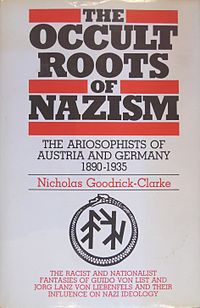Top Qs
Timeline
Chat
Perspective
The Occult Roots of Nazism
History book by Nicholas Goodrick-Clarke From Wikipedia, the free encyclopedia
Remove ads
The Occult Roots of Nazism: The Ariosophists of Austria and Germany, 1890–1935 is a book about Nazi occultism and Ariosophy by historian Nicholas Goodrick-Clarke, who traces some of its roots back to esotericism in Germany and Austria between 1880 and 1945. The foreword is by Rohan Butler, who had written The Roots of National Socialism in the 1930s. The book is based on Goodrick-Clarke's 1982 Ph.D. thesis.
It was first published by The Aquarian Press in 1985, and republished in paperback form by New York University Press in 1992. The book was highly regarded upon its publication and has been called the seminal work on the topic of Nazism and occultism and as Goodrick-Clarke's most influential work.
Remove ads
Background and publication history
Summarize
Perspective
The book is based on Nicholas Goodrick-Clarke's 1982 Ph.D. thesis The ariosophists of Austria and Germany 1890-1935: Reactionary political fantasy in relation to social anxiety.[1][2] It was first published in England by The Aquarian Press in 1985 (ISBN 0-85030-402-4). In 1992, it was republished as a paperback with a different subtitle by New York University Press in New York, as The Occult Roots of Nazism: Secret Aryan Cults and Their Influence on Nazi Ideology (ISBN 0-8147-3060-4), and again by that title in an expanded edition with a new preface in 2004 by I.B. Tauris & Co (ISBN 1-86064-973-4).
The book has been continually in print since its first publication in 1985, and has been translated into twelve languages, including Spanish, French, Polish, Italian, Russian, Czech, German and Greek.[3][4] The German edition features a preface and an additional 15-page essay Nationalsozialismus und Okkultismus (transl. National Socialism and Occultism) by H.T. Hakl.
Remove ads
Contents
The book traces the connections between Nazism and esotericism in Germany and Austria between 1880 and 1945. He profiles the various leaders of the movement at hand, for which he coins the name Ariosophy.[5] Goodrick-Clarke does not directly attribute the Nazi Party to the occultist German nationalism he profiles.[6][7]
Reception
The book was highly regarded upon its publication and has been called the seminal work on the topic of Nazism and occultism,[8][9][10] as well as the author's most influential work.[11][12] Jeffrey Kaplan stated in 1998 that it "remains the definitive work on the subject".[8] Eric Kurlander noted it as "arguably the best book in this genre: it illustrates the significance, as well as the limits, of the influence of Austro-German occultism on National Socialism."[9] It received praise for being a serious scholarly effort on a subject which otherwise attracted many fringe or mythical claims.[5][13]
References
External links
Wikiwand - on
Seamless Wikipedia browsing. On steroids.
Remove ads

